Accounting Theory: IFRS, Public Interest, and Convergence
VerifiedAdded on 2019/12/28
|10
|3302
|145
Report
AI Summary
This report delves into the application of International Financial Reporting Standards (IFRS) within government departments, focusing on the convergence of accounting standards globally. It explores the rationale behind adopting IFRS, emphasizing the benefits for investors, cost reduction, transparency, and accountability. The report analyzes the impact of IFRS on public departments, including its role in financial statement preparation and the potential for manipulation. Furthermore, it examines the International Accounting Standards Board's (IASB) role in public interest, highlighting how IFRS promotes accurate financial reporting and facilitates informed decision-making by stakeholders. The report concludes by discussing whether IFRS should be adopted by Australian local authorities, considering its implications for financial reporting and the public sector.

ACCOUNTING THEORY
Paraphrase This Document
Need a fresh take? Get an instant paraphrase of this document with our AI Paraphraser
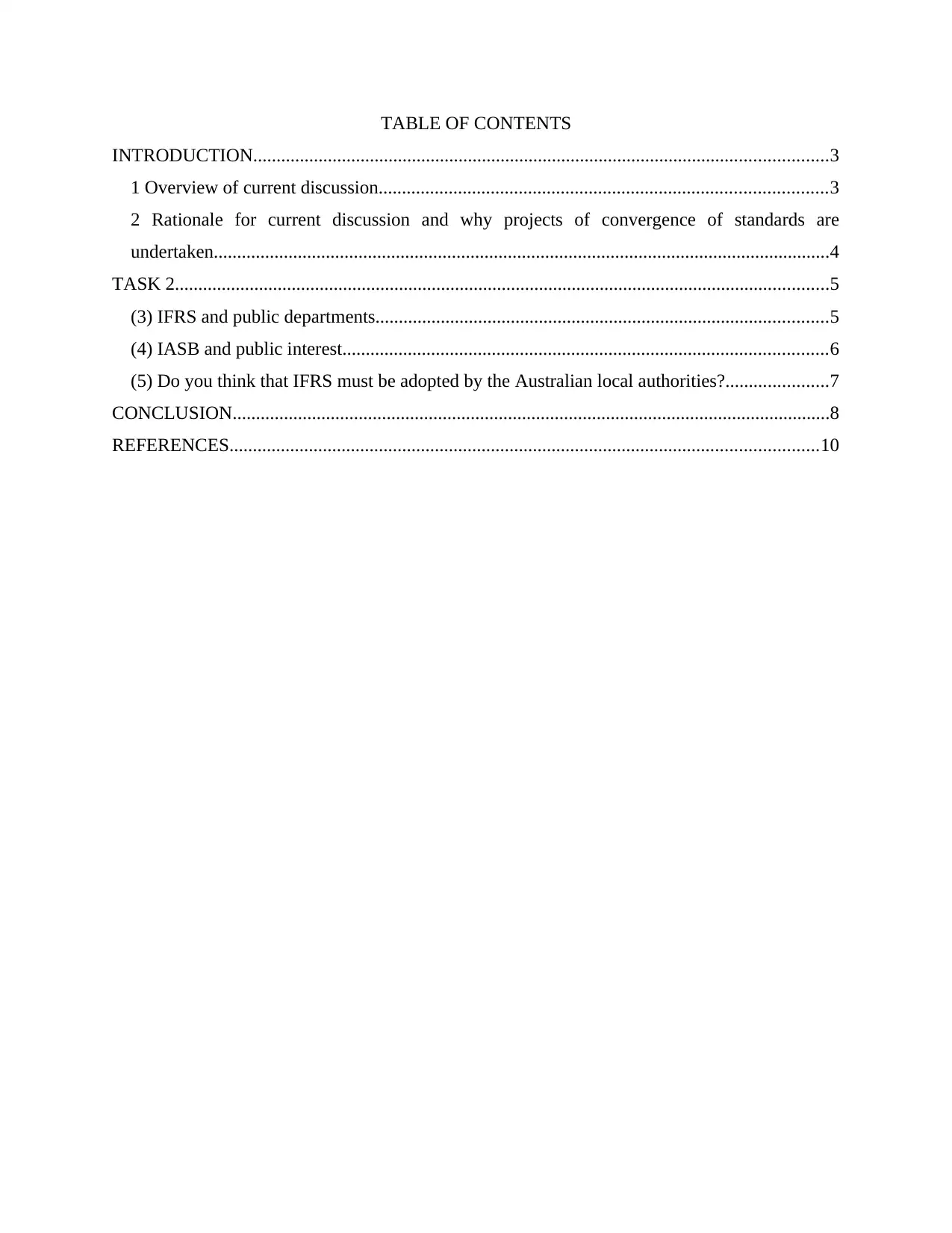
TABLE OF CONTENTS
INTRODUCTION...........................................................................................................................3
1 Overview of current discussion................................................................................................3
2 Rationale for current discussion and why projects of convergence of standards are
undertaken....................................................................................................................................4
TASK 2............................................................................................................................................5
(3) IFRS and public departments.................................................................................................5
(4) IASB and public interest........................................................................................................6
(5) Do you think that IFRS must be adopted by the Australian local authorities?......................7
CONCLUSION................................................................................................................................8
REFERENCES..............................................................................................................................10
INTRODUCTION...........................................................................................................................3
1 Overview of current discussion................................................................................................3
2 Rationale for current discussion and why projects of convergence of standards are
undertaken....................................................................................................................................4
TASK 2............................................................................................................................................5
(3) IFRS and public departments.................................................................................................5
(4) IASB and public interest........................................................................................................6
(5) Do you think that IFRS must be adopted by the Australian local authorities?......................7
CONCLUSION................................................................................................................................8
REFERENCES..............................................................................................................................10
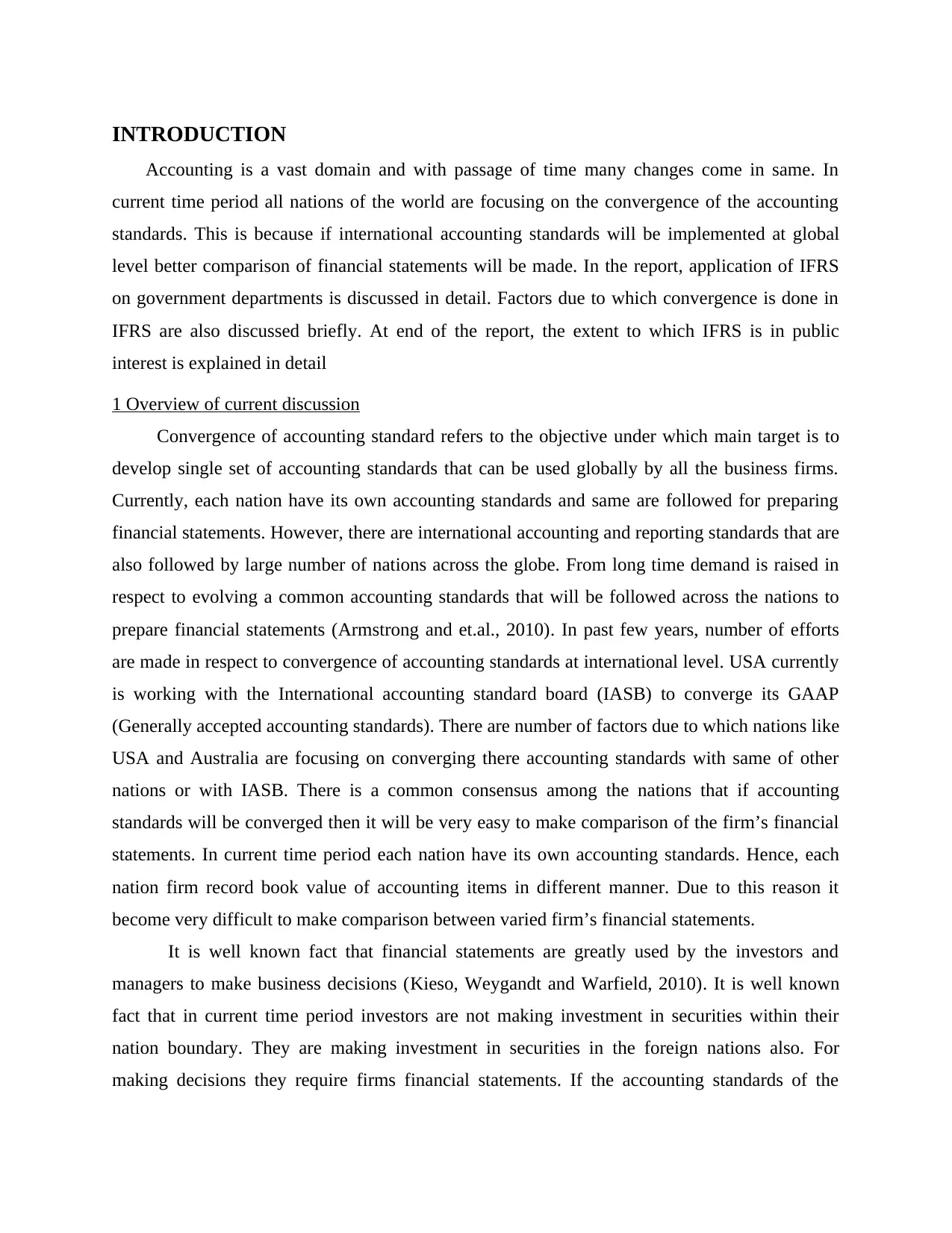
INTRODUCTION
Accounting is a vast domain and with passage of time many changes come in same. In
current time period all nations of the world are focusing on the convergence of the accounting
standards. This is because if international accounting standards will be implemented at global
level better comparison of financial statements will be made. In the report, application of IFRS
on government departments is discussed in detail. Factors due to which convergence is done in
IFRS are also discussed briefly. At end of the report, the extent to which IFRS is in public
interest is explained in detail
1 Overview of current discussion
Convergence of accounting standard refers to the objective under which main target is to
develop single set of accounting standards that can be used globally by all the business firms.
Currently, each nation have its own accounting standards and same are followed for preparing
financial statements. However, there are international accounting and reporting standards that are
also followed by large number of nations across the globe. From long time demand is raised in
respect to evolving a common accounting standards that will be followed across the nations to
prepare financial statements (Armstrong and et.al., 2010). In past few years, number of efforts
are made in respect to convergence of accounting standards at international level. USA currently
is working with the International accounting standard board (IASB) to converge its GAAP
(Generally accepted accounting standards). There are number of factors due to which nations like
USA and Australia are focusing on converging there accounting standards with same of other
nations or with IASB. There is a common consensus among the nations that if accounting
standards will be converged then it will be very easy to make comparison of the firm’s financial
statements. In current time period each nation have its own accounting standards. Hence, each
nation firm record book value of accounting items in different manner. Due to this reason it
become very difficult to make comparison between varied firm’s financial statements.
It is well known fact that financial statements are greatly used by the investors and
managers to make business decisions (Kieso, Weygandt and Warfield, 2010). It is well known
fact that in current time period investors are not making investment in securities within their
nation boundary. They are making investment in securities in the foreign nations also. For
making decisions they require firms financial statements. If the accounting standards of the
Accounting is a vast domain and with passage of time many changes come in same. In
current time period all nations of the world are focusing on the convergence of the accounting
standards. This is because if international accounting standards will be implemented at global
level better comparison of financial statements will be made. In the report, application of IFRS
on government departments is discussed in detail. Factors due to which convergence is done in
IFRS are also discussed briefly. At end of the report, the extent to which IFRS is in public
interest is explained in detail
1 Overview of current discussion
Convergence of accounting standard refers to the objective under which main target is to
develop single set of accounting standards that can be used globally by all the business firms.
Currently, each nation have its own accounting standards and same are followed for preparing
financial statements. However, there are international accounting and reporting standards that are
also followed by large number of nations across the globe. From long time demand is raised in
respect to evolving a common accounting standards that will be followed across the nations to
prepare financial statements (Armstrong and et.al., 2010). In past few years, number of efforts
are made in respect to convergence of accounting standards at international level. USA currently
is working with the International accounting standard board (IASB) to converge its GAAP
(Generally accepted accounting standards). There are number of factors due to which nations like
USA and Australia are focusing on converging there accounting standards with same of other
nations or with IASB. There is a common consensus among the nations that if accounting
standards will be converged then it will be very easy to make comparison of the firm’s financial
statements. In current time period each nation have its own accounting standards. Hence, each
nation firm record book value of accounting items in different manner. Due to this reason it
become very difficult to make comparison between varied firm’s financial statements.
It is well known fact that financial statements are greatly used by the investors and
managers to make business decisions (Kieso, Weygandt and Warfield, 2010). It is well known
fact that in current time period investors are not making investment in securities within their
nation boundary. They are making investment in securities in the foreign nations also. For
making decisions they require firms financial statements. If the accounting standards of the
⊘ This is a preview!⊘
Do you want full access?
Subscribe today to unlock all pages.

Trusted by 1+ million students worldwide
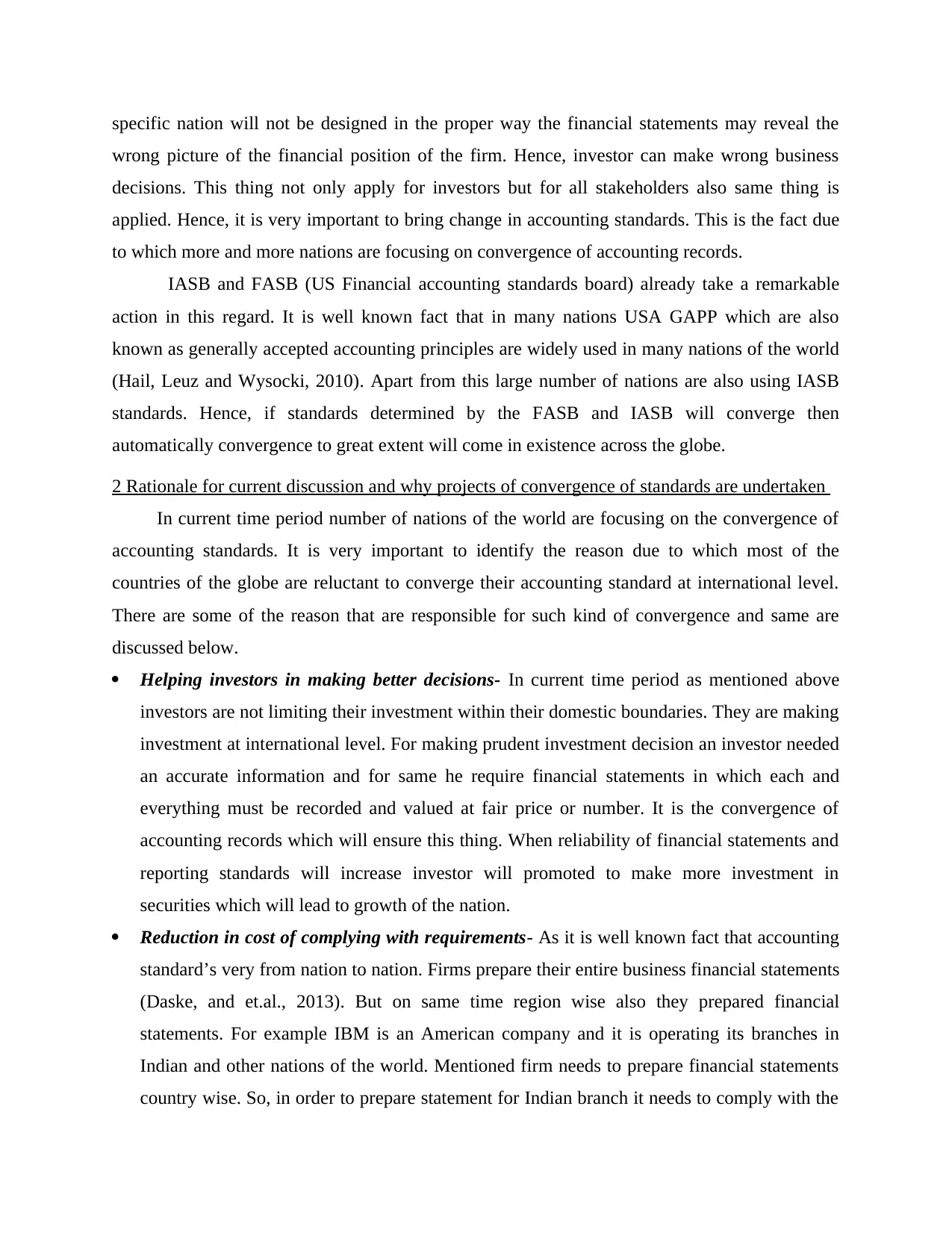
specific nation will not be designed in the proper way the financial statements may reveal the
wrong picture of the financial position of the firm. Hence, investor can make wrong business
decisions. This thing not only apply for investors but for all stakeholders also same thing is
applied. Hence, it is very important to bring change in accounting standards. This is the fact due
to which more and more nations are focusing on convergence of accounting records.
IASB and FASB (US Financial accounting standards board) already take a remarkable
action in this regard. It is well known fact that in many nations USA GAPP which are also
known as generally accepted accounting principles are widely used in many nations of the world
(Hail, Leuz and Wysocki, 2010). Apart from this large number of nations are also using IASB
standards. Hence, if standards determined by the FASB and IASB will converge then
automatically convergence to great extent will come in existence across the globe.
2 Rationale for current discussion and why projects of convergence of standards are undertaken
In current time period number of nations of the world are focusing on the convergence of
accounting standards. It is very important to identify the reason due to which most of the
countries of the globe are reluctant to converge their accounting standard at international level.
There are some of the reason that are responsible for such kind of convergence and same are
discussed below.
Helping investors in making better decisions- In current time period as mentioned above
investors are not limiting their investment within their domestic boundaries. They are making
investment at international level. For making prudent investment decision an investor needed
an accurate information and for same he require financial statements in which each and
everything must be recorded and valued at fair price or number. It is the convergence of
accounting records which will ensure this thing. When reliability of financial statements and
reporting standards will increase investor will promoted to make more investment in
securities which will lead to growth of the nation.
Reduction in cost of complying with requirements- As it is well known fact that accounting
standard’s very from nation to nation. Firms prepare their entire business financial statements
(Daske, and et.al., 2013). But on same time region wise also they prepared financial
statements. For example IBM is an American company and it is operating its branches in
Indian and other nations of the world. Mentioned firm needs to prepare financial statements
country wise. So, in order to prepare statement for Indian branch it needs to comply with the
wrong picture of the financial position of the firm. Hence, investor can make wrong business
decisions. This thing not only apply for investors but for all stakeholders also same thing is
applied. Hence, it is very important to bring change in accounting standards. This is the fact due
to which more and more nations are focusing on convergence of accounting records.
IASB and FASB (US Financial accounting standards board) already take a remarkable
action in this regard. It is well known fact that in many nations USA GAPP which are also
known as generally accepted accounting principles are widely used in many nations of the world
(Hail, Leuz and Wysocki, 2010). Apart from this large number of nations are also using IASB
standards. Hence, if standards determined by the FASB and IASB will converge then
automatically convergence to great extent will come in existence across the globe.
2 Rationale for current discussion and why projects of convergence of standards are undertaken
In current time period number of nations of the world are focusing on the convergence of
accounting standards. It is very important to identify the reason due to which most of the
countries of the globe are reluctant to converge their accounting standard at international level.
There are some of the reason that are responsible for such kind of convergence and same are
discussed below.
Helping investors in making better decisions- In current time period as mentioned above
investors are not limiting their investment within their domestic boundaries. They are making
investment at international level. For making prudent investment decision an investor needed
an accurate information and for same he require financial statements in which each and
everything must be recorded and valued at fair price or number. It is the convergence of
accounting records which will ensure this thing. When reliability of financial statements and
reporting standards will increase investor will promoted to make more investment in
securities which will lead to growth of the nation.
Reduction in cost of complying with requirements- As it is well known fact that accounting
standard’s very from nation to nation. Firms prepare their entire business financial statements
(Daske, and et.al., 2013). But on same time region wise also they prepared financial
statements. For example IBM is an American company and it is operating its branches in
Indian and other nations of the world. Mentioned firm needs to prepare financial statements
country wise. So, in order to prepare statement for Indian branch it needs to comply with the
Paraphrase This Document
Need a fresh take? Get an instant paraphrase of this document with our AI Paraphraser
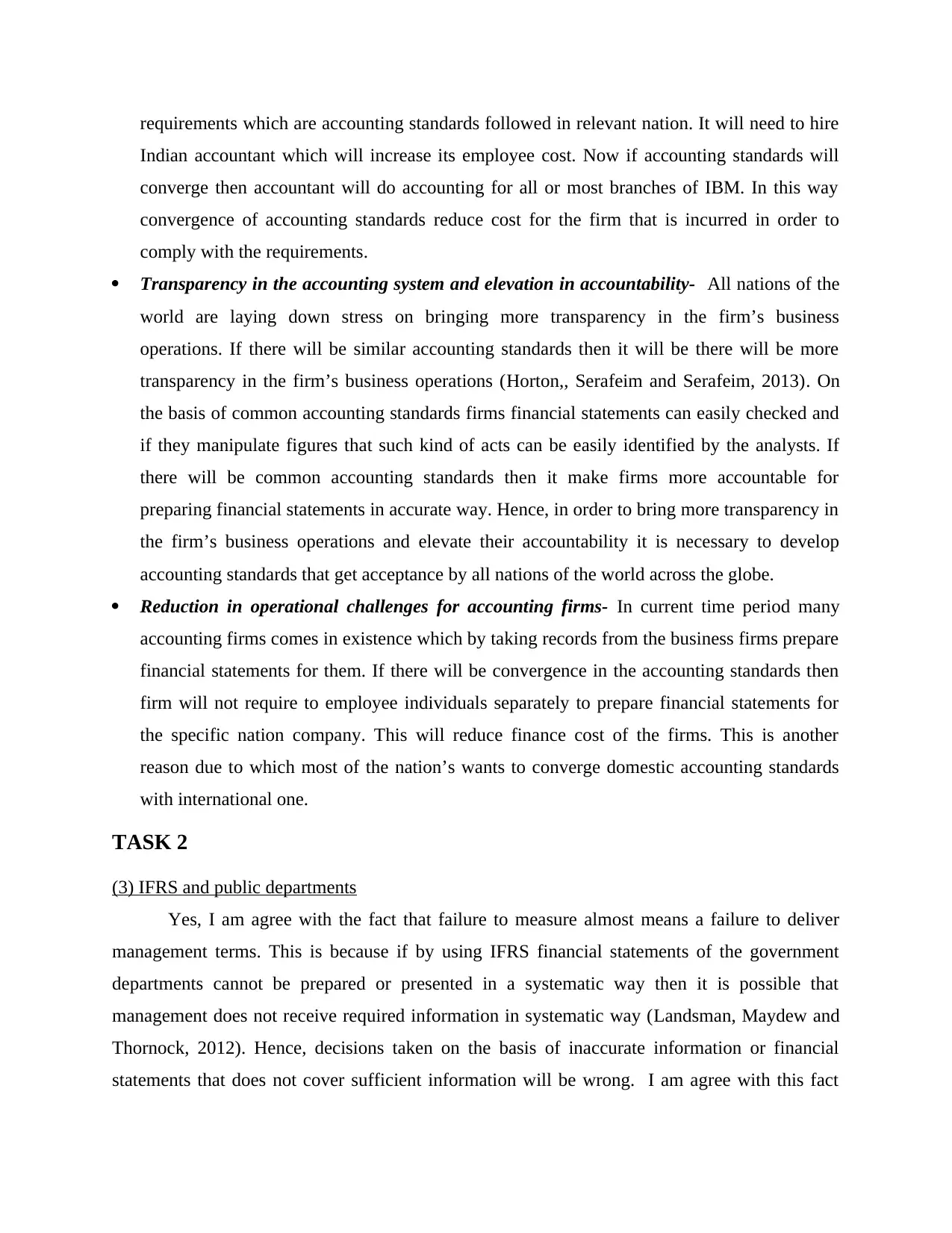
requirements which are accounting standards followed in relevant nation. It will need to hire
Indian accountant which will increase its employee cost. Now if accounting standards will
converge then accountant will do accounting for all or most branches of IBM. In this way
convergence of accounting standards reduce cost for the firm that is incurred in order to
comply with the requirements.
Transparency in the accounting system and elevation in accountability- All nations of the
world are laying down stress on bringing more transparency in the firm’s business
operations. If there will be similar accounting standards then it will be there will be more
transparency in the firm’s business operations (Horton,, Serafeim and Serafeim, 2013). On
the basis of common accounting standards firms financial statements can easily checked and
if they manipulate figures that such kind of acts can be easily identified by the analysts. If
there will be common accounting standards then it make firms more accountable for
preparing financial statements in accurate way. Hence, in order to bring more transparency in
the firm’s business operations and elevate their accountability it is necessary to develop
accounting standards that get acceptance by all nations of the world across the globe.
Reduction in operational challenges for accounting firms- In current time period many
accounting firms comes in existence which by taking records from the business firms prepare
financial statements for them. If there will be convergence in the accounting standards then
firm will not require to employee individuals separately to prepare financial statements for
the specific nation company. This will reduce finance cost of the firms. This is another
reason due to which most of the nation’s wants to converge domestic accounting standards
with international one.
TASK 2
(3) IFRS and public departments
Yes, I am agree with the fact that failure to measure almost means a failure to deliver
management terms. This is because if by using IFRS financial statements of the government
departments cannot be prepared or presented in a systematic way then it is possible that
management does not receive required information in systematic way (Landsman, Maydew and
Thornock, 2012). Hence, decisions taken on the basis of inaccurate information or financial
statements that does not cover sufficient information will be wrong. I am agree with this fact
Indian accountant which will increase its employee cost. Now if accounting standards will
converge then accountant will do accounting for all or most branches of IBM. In this way
convergence of accounting standards reduce cost for the firm that is incurred in order to
comply with the requirements.
Transparency in the accounting system and elevation in accountability- All nations of the
world are laying down stress on bringing more transparency in the firm’s business
operations. If there will be similar accounting standards then it will be there will be more
transparency in the firm’s business operations (Horton,, Serafeim and Serafeim, 2013). On
the basis of common accounting standards firms financial statements can easily checked and
if they manipulate figures that such kind of acts can be easily identified by the analysts. If
there will be common accounting standards then it make firms more accountable for
preparing financial statements in accurate way. Hence, in order to bring more transparency in
the firm’s business operations and elevate their accountability it is necessary to develop
accounting standards that get acceptance by all nations of the world across the globe.
Reduction in operational challenges for accounting firms- In current time period many
accounting firms comes in existence which by taking records from the business firms prepare
financial statements for them. If there will be convergence in the accounting standards then
firm will not require to employee individuals separately to prepare financial statements for
the specific nation company. This will reduce finance cost of the firms. This is another
reason due to which most of the nation’s wants to converge domestic accounting standards
with international one.
TASK 2
(3) IFRS and public departments
Yes, I am agree with the fact that failure to measure almost means a failure to deliver
management terms. This is because if by using IFRS financial statements of the government
departments cannot be prepared or presented in a systematic way then it is possible that
management does not receive required information in systematic way (Landsman, Maydew and
Thornock, 2012). Hence, decisions taken on the basis of inaccurate information or financial
statements that does not cover sufficient information will be wrong. I am agree with this fact
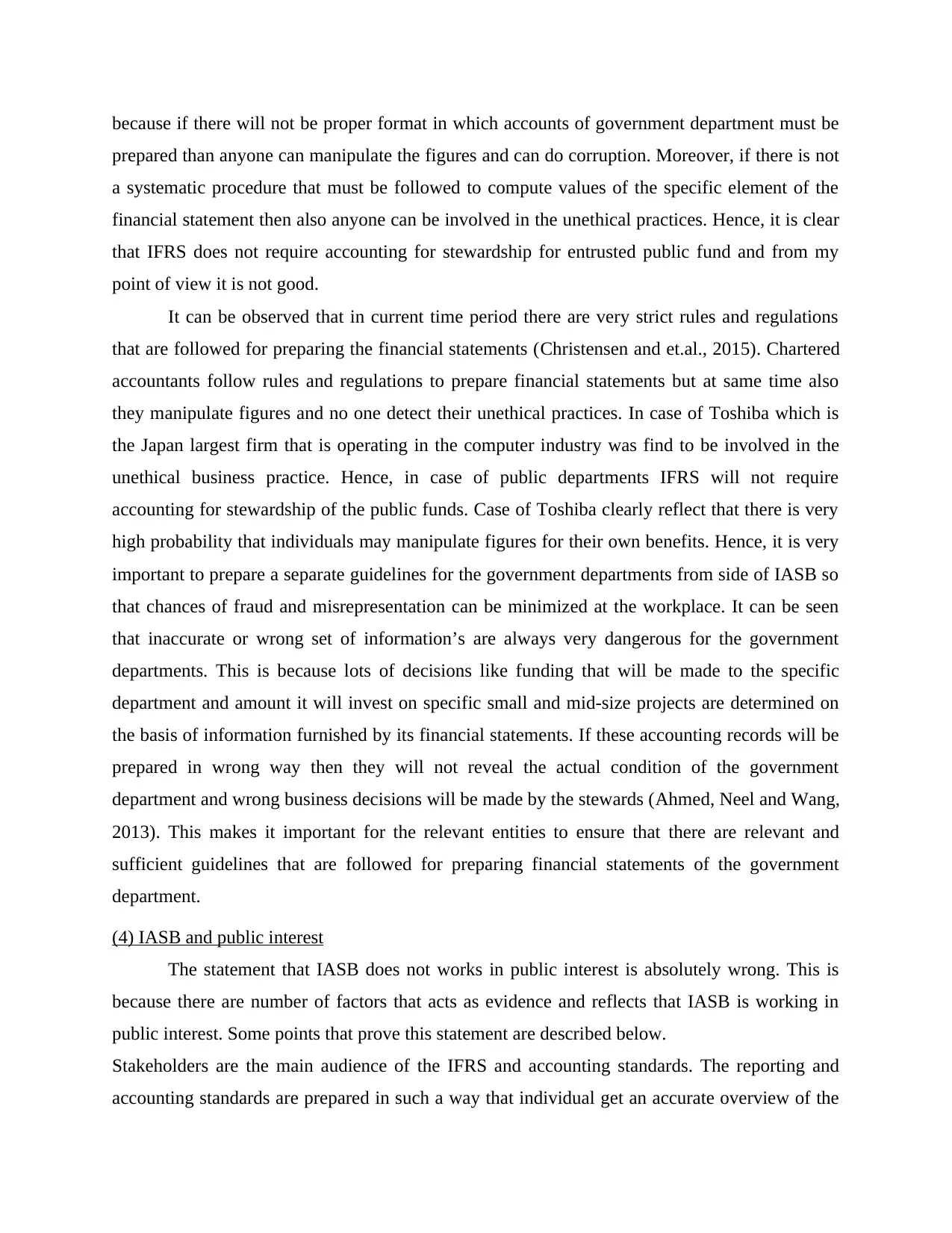
because if there will not be proper format in which accounts of government department must be
prepared than anyone can manipulate the figures and can do corruption. Moreover, if there is not
a systematic procedure that must be followed to compute values of the specific element of the
financial statement then also anyone can be involved in the unethical practices. Hence, it is clear
that IFRS does not require accounting for stewardship for entrusted public fund and from my
point of view it is not good.
It can be observed that in current time period there are very strict rules and regulations
that are followed for preparing the financial statements (Christensen and et.al., 2015). Chartered
accountants follow rules and regulations to prepare financial statements but at same time also
they manipulate figures and no one detect their unethical practices. In case of Toshiba which is
the Japan largest firm that is operating in the computer industry was find to be involved in the
unethical business practice. Hence, in case of public departments IFRS will not require
accounting for stewardship of the public funds. Case of Toshiba clearly reflect that there is very
high probability that individuals may manipulate figures for their own benefits. Hence, it is very
important to prepare a separate guidelines for the government departments from side of IASB so
that chances of fraud and misrepresentation can be minimized at the workplace. It can be seen
that inaccurate or wrong set of information’s are always very dangerous for the government
departments. This is because lots of decisions like funding that will be made to the specific
department and amount it will invest on specific small and mid-size projects are determined on
the basis of information furnished by its financial statements. If these accounting records will be
prepared in wrong way then they will not reveal the actual condition of the government
department and wrong business decisions will be made by the stewards (Ahmed, Neel and Wang,
2013). This makes it important for the relevant entities to ensure that there are relevant and
sufficient guidelines that are followed for preparing financial statements of the government
department.
(4) IASB and public interest
The statement that IASB does not works in public interest is absolutely wrong. This is
because there are number of factors that acts as evidence and reflects that IASB is working in
public interest. Some points that prove this statement are described below.
Stakeholders are the main audience of the IFRS and accounting standards. The reporting and
accounting standards are prepared in such a way that individual get an accurate overview of the
prepared than anyone can manipulate the figures and can do corruption. Moreover, if there is not
a systematic procedure that must be followed to compute values of the specific element of the
financial statement then also anyone can be involved in the unethical practices. Hence, it is clear
that IFRS does not require accounting for stewardship for entrusted public fund and from my
point of view it is not good.
It can be observed that in current time period there are very strict rules and regulations
that are followed for preparing the financial statements (Christensen and et.al., 2015). Chartered
accountants follow rules and regulations to prepare financial statements but at same time also
they manipulate figures and no one detect their unethical practices. In case of Toshiba which is
the Japan largest firm that is operating in the computer industry was find to be involved in the
unethical business practice. Hence, in case of public departments IFRS will not require
accounting for stewardship of the public funds. Case of Toshiba clearly reflect that there is very
high probability that individuals may manipulate figures for their own benefits. Hence, it is very
important to prepare a separate guidelines for the government departments from side of IASB so
that chances of fraud and misrepresentation can be minimized at the workplace. It can be seen
that inaccurate or wrong set of information’s are always very dangerous for the government
departments. This is because lots of decisions like funding that will be made to the specific
department and amount it will invest on specific small and mid-size projects are determined on
the basis of information furnished by its financial statements. If these accounting records will be
prepared in wrong way then they will not reveal the actual condition of the government
department and wrong business decisions will be made by the stewards (Ahmed, Neel and Wang,
2013). This makes it important for the relevant entities to ensure that there are relevant and
sufficient guidelines that are followed for preparing financial statements of the government
department.
(4) IASB and public interest
The statement that IASB does not works in public interest is absolutely wrong. This is
because there are number of factors that acts as evidence and reflects that IASB is working in
public interest. Some points that prove this statement are described below.
Stakeholders are the main audience of the IFRS and accounting standards. The reporting and
accounting standards are prepared in such a way that individual get an accurate overview of the
⊘ This is a preview!⊘
Do you want full access?
Subscribe today to unlock all pages.

Trusted by 1+ million students worldwide
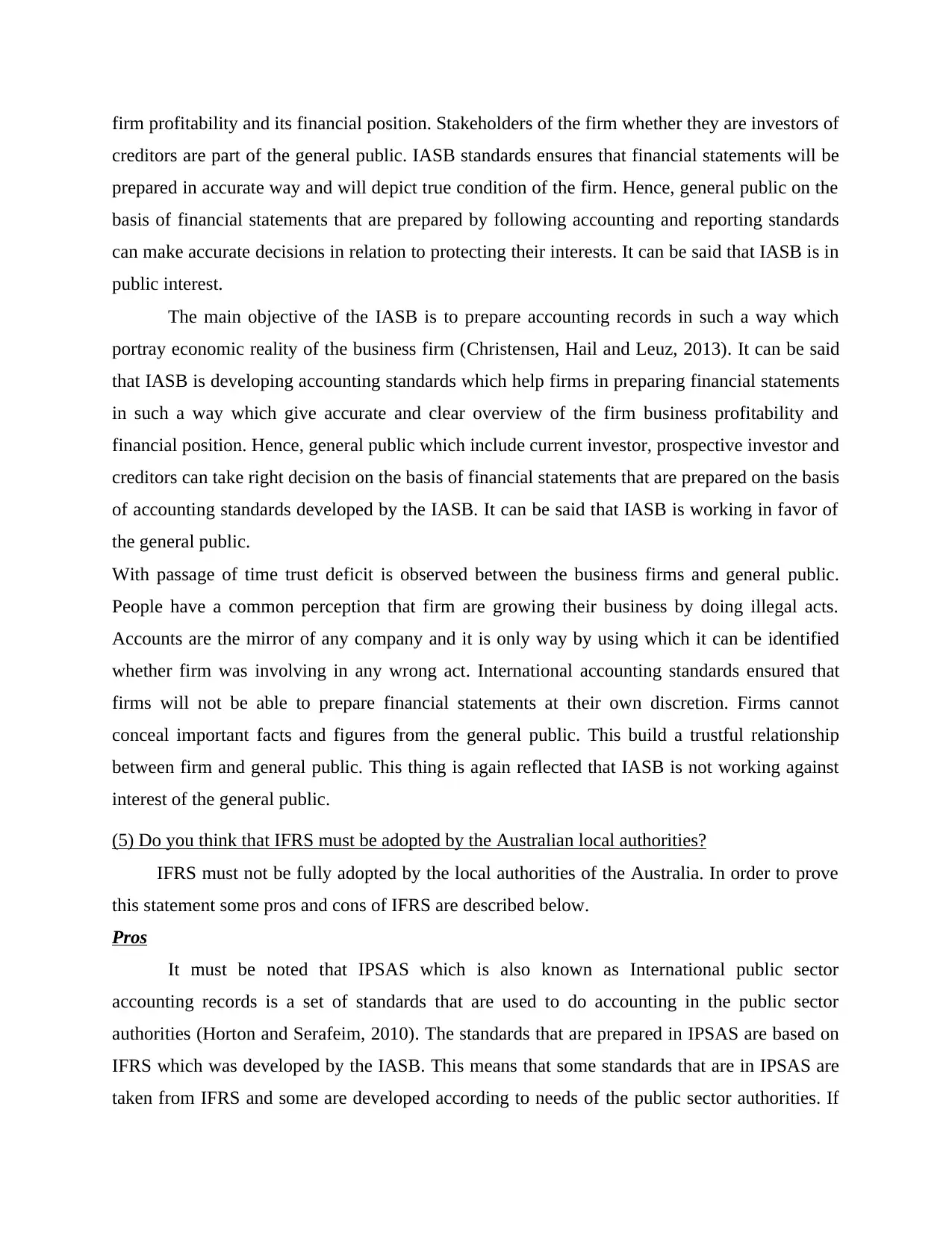
firm profitability and its financial position. Stakeholders of the firm whether they are investors of
creditors are part of the general public. IASB standards ensures that financial statements will be
prepared in accurate way and will depict true condition of the firm. Hence, general public on the
basis of financial statements that are prepared by following accounting and reporting standards
can make accurate decisions in relation to protecting their interests. It can be said that IASB is in
public interest.
The main objective of the IASB is to prepare accounting records in such a way which
portray economic reality of the business firm (Christensen, Hail and Leuz, 2013). It can be said
that IASB is developing accounting standards which help firms in preparing financial statements
in such a way which give accurate and clear overview of the firm business profitability and
financial position. Hence, general public which include current investor, prospective investor and
creditors can take right decision on the basis of financial statements that are prepared on the basis
of accounting standards developed by the IASB. It can be said that IASB is working in favor of
the general public.
With passage of time trust deficit is observed between the business firms and general public.
People have a common perception that firm are growing their business by doing illegal acts.
Accounts are the mirror of any company and it is only way by using which it can be identified
whether firm was involving in any wrong act. International accounting standards ensured that
firms will not be able to prepare financial statements at their own discretion. Firms cannot
conceal important facts and figures from the general public. This build a trustful relationship
between firm and general public. This thing is again reflected that IASB is not working against
interest of the general public.
(5) Do you think that IFRS must be adopted by the Australian local authorities?
IFRS must not be fully adopted by the local authorities of the Australia. In order to prove
this statement some pros and cons of IFRS are described below.
Pros
It must be noted that IPSAS which is also known as International public sector
accounting records is a set of standards that are used to do accounting in the public sector
authorities (Horton and Serafeim, 2010). The standards that are prepared in IPSAS are based on
IFRS which was developed by the IASB. This means that some standards that are in IPSAS are
taken from IFRS and some are developed according to needs of the public sector authorities. If
creditors are part of the general public. IASB standards ensures that financial statements will be
prepared in accurate way and will depict true condition of the firm. Hence, general public on the
basis of financial statements that are prepared by following accounting and reporting standards
can make accurate decisions in relation to protecting their interests. It can be said that IASB is in
public interest.
The main objective of the IASB is to prepare accounting records in such a way which
portray economic reality of the business firm (Christensen, Hail and Leuz, 2013). It can be said
that IASB is developing accounting standards which help firms in preparing financial statements
in such a way which give accurate and clear overview of the firm business profitability and
financial position. Hence, general public which include current investor, prospective investor and
creditors can take right decision on the basis of financial statements that are prepared on the basis
of accounting standards developed by the IASB. It can be said that IASB is working in favor of
the general public.
With passage of time trust deficit is observed between the business firms and general public.
People have a common perception that firm are growing their business by doing illegal acts.
Accounts are the mirror of any company and it is only way by using which it can be identified
whether firm was involving in any wrong act. International accounting standards ensured that
firms will not be able to prepare financial statements at their own discretion. Firms cannot
conceal important facts and figures from the general public. This build a trustful relationship
between firm and general public. This thing is again reflected that IASB is not working against
interest of the general public.
(5) Do you think that IFRS must be adopted by the Australian local authorities?
IFRS must not be fully adopted by the local authorities of the Australia. In order to prove
this statement some pros and cons of IFRS are described below.
Pros
It must be noted that IPSAS which is also known as International public sector
accounting records is a set of standards that are used to do accounting in the public sector
authorities (Horton and Serafeim, 2010). The standards that are prepared in IPSAS are based on
IFRS which was developed by the IASB. This means that some standards that are in IPSAS are
taken from IFRS and some are developed according to needs of the public sector authorities. If
Paraphrase This Document
Need a fresh take? Get an instant paraphrase of this document with our AI Paraphraser
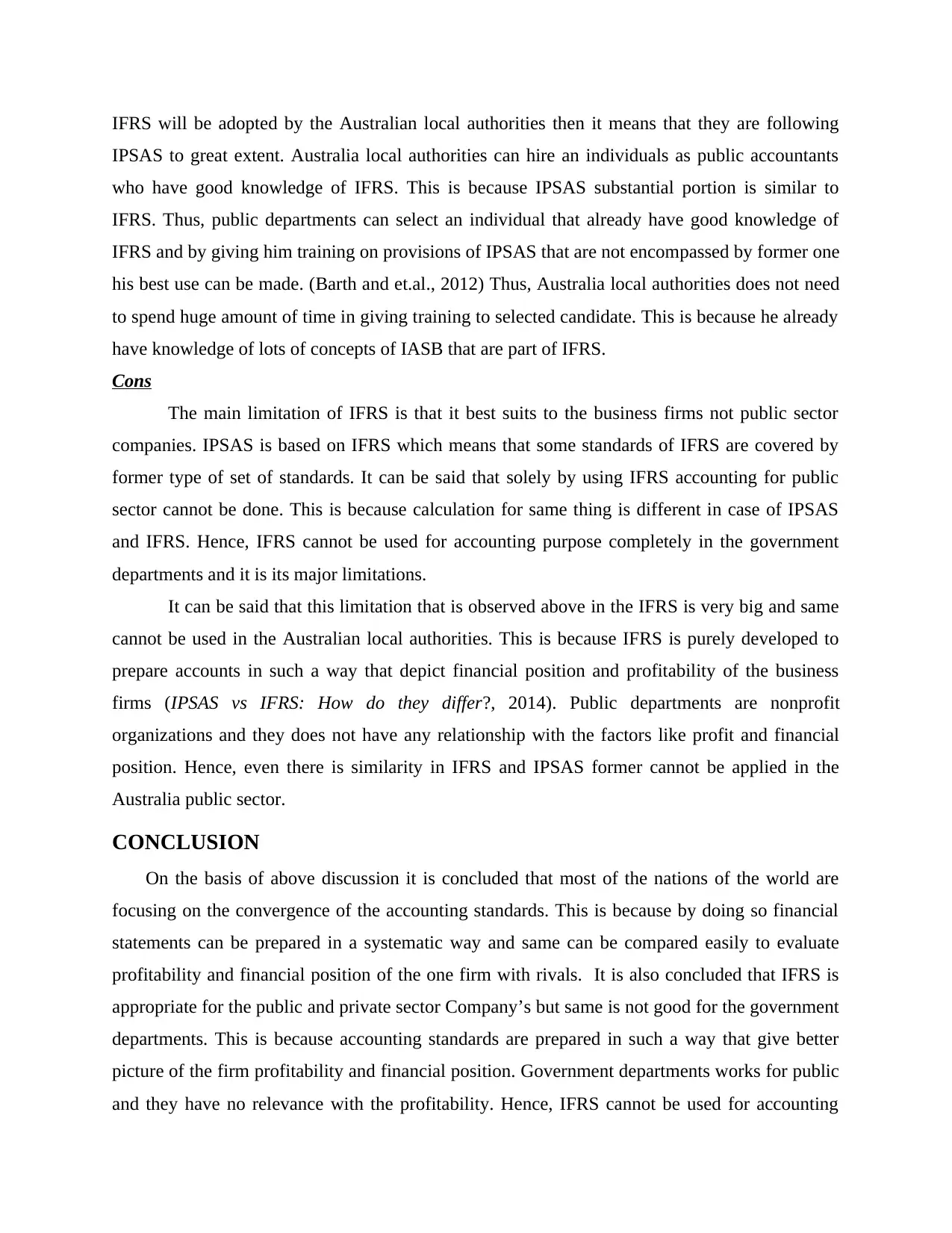
IFRS will be adopted by the Australian local authorities then it means that they are following
IPSAS to great extent. Australia local authorities can hire an individuals as public accountants
who have good knowledge of IFRS. This is because IPSAS substantial portion is similar to
IFRS. Thus, public departments can select an individual that already have good knowledge of
IFRS and by giving him training on provisions of IPSAS that are not encompassed by former one
his best use can be made. (Barth and et.al., 2012) Thus, Australia local authorities does not need
to spend huge amount of time in giving training to selected candidate. This is because he already
have knowledge of lots of concepts of IASB that are part of IFRS.
Cons
The main limitation of IFRS is that it best suits to the business firms not public sector
companies. IPSAS is based on IFRS which means that some standards of IFRS are covered by
former type of set of standards. It can be said that solely by using IFRS accounting for public
sector cannot be done. This is because calculation for same thing is different in case of IPSAS
and IFRS. Hence, IFRS cannot be used for accounting purpose completely in the government
departments and it is its major limitations.
It can be said that this limitation that is observed above in the IFRS is very big and same
cannot be used in the Australian local authorities. This is because IFRS is purely developed to
prepare accounts in such a way that depict financial position and profitability of the business
firms (IPSAS vs IFRS: How do they differ?, 2014). Public departments are nonprofit
organizations and they does not have any relationship with the factors like profit and financial
position. Hence, even there is similarity in IFRS and IPSAS former cannot be applied in the
Australia public sector.
CONCLUSION
On the basis of above discussion it is concluded that most of the nations of the world are
focusing on the convergence of the accounting standards. This is because by doing so financial
statements can be prepared in a systematic way and same can be compared easily to evaluate
profitability and financial position of the one firm with rivals. It is also concluded that IFRS is
appropriate for the public and private sector Company’s but same is not good for the government
departments. This is because accounting standards are prepared in such a way that give better
picture of the firm profitability and financial position. Government departments works for public
and they have no relevance with the profitability. Hence, IFRS cannot be used for accounting
IPSAS to great extent. Australia local authorities can hire an individuals as public accountants
who have good knowledge of IFRS. This is because IPSAS substantial portion is similar to
IFRS. Thus, public departments can select an individual that already have good knowledge of
IFRS and by giving him training on provisions of IPSAS that are not encompassed by former one
his best use can be made. (Barth and et.al., 2012) Thus, Australia local authorities does not need
to spend huge amount of time in giving training to selected candidate. This is because he already
have knowledge of lots of concepts of IASB that are part of IFRS.
Cons
The main limitation of IFRS is that it best suits to the business firms not public sector
companies. IPSAS is based on IFRS which means that some standards of IFRS are covered by
former type of set of standards. It can be said that solely by using IFRS accounting for public
sector cannot be done. This is because calculation for same thing is different in case of IPSAS
and IFRS. Hence, IFRS cannot be used for accounting purpose completely in the government
departments and it is its major limitations.
It can be said that this limitation that is observed above in the IFRS is very big and same
cannot be used in the Australian local authorities. This is because IFRS is purely developed to
prepare accounts in such a way that depict financial position and profitability of the business
firms (IPSAS vs IFRS: How do they differ?, 2014). Public departments are nonprofit
organizations and they does not have any relationship with the factors like profit and financial
position. Hence, even there is similarity in IFRS and IPSAS former cannot be applied in the
Australia public sector.
CONCLUSION
On the basis of above discussion it is concluded that most of the nations of the world are
focusing on the convergence of the accounting standards. This is because by doing so financial
statements can be prepared in a systematic way and same can be compared easily to evaluate
profitability and financial position of the one firm with rivals. It is also concluded that IFRS is
appropriate for the public and private sector Company’s but same is not good for the government
departments. This is because accounting standards are prepared in such a way that give better
picture of the firm profitability and financial position. Government departments works for public
and they have no relevance with the profitability. Hence, IFRS cannot be used for accounting

purpose in the public departments. It is also concluded that IFRS are prepared in the public
interest as it ensure that lots of valuable information’s will be available to the stakeholders.
Stakeholders are the part of the public. Hence, IFRS is in public interest and it is not against
same.
interest as it ensure that lots of valuable information’s will be available to the stakeholders.
Stakeholders are the part of the public. Hence, IFRS is in public interest and it is not against
same.
⊘ This is a preview!⊘
Do you want full access?
Subscribe today to unlock all pages.

Trusted by 1+ million students worldwide
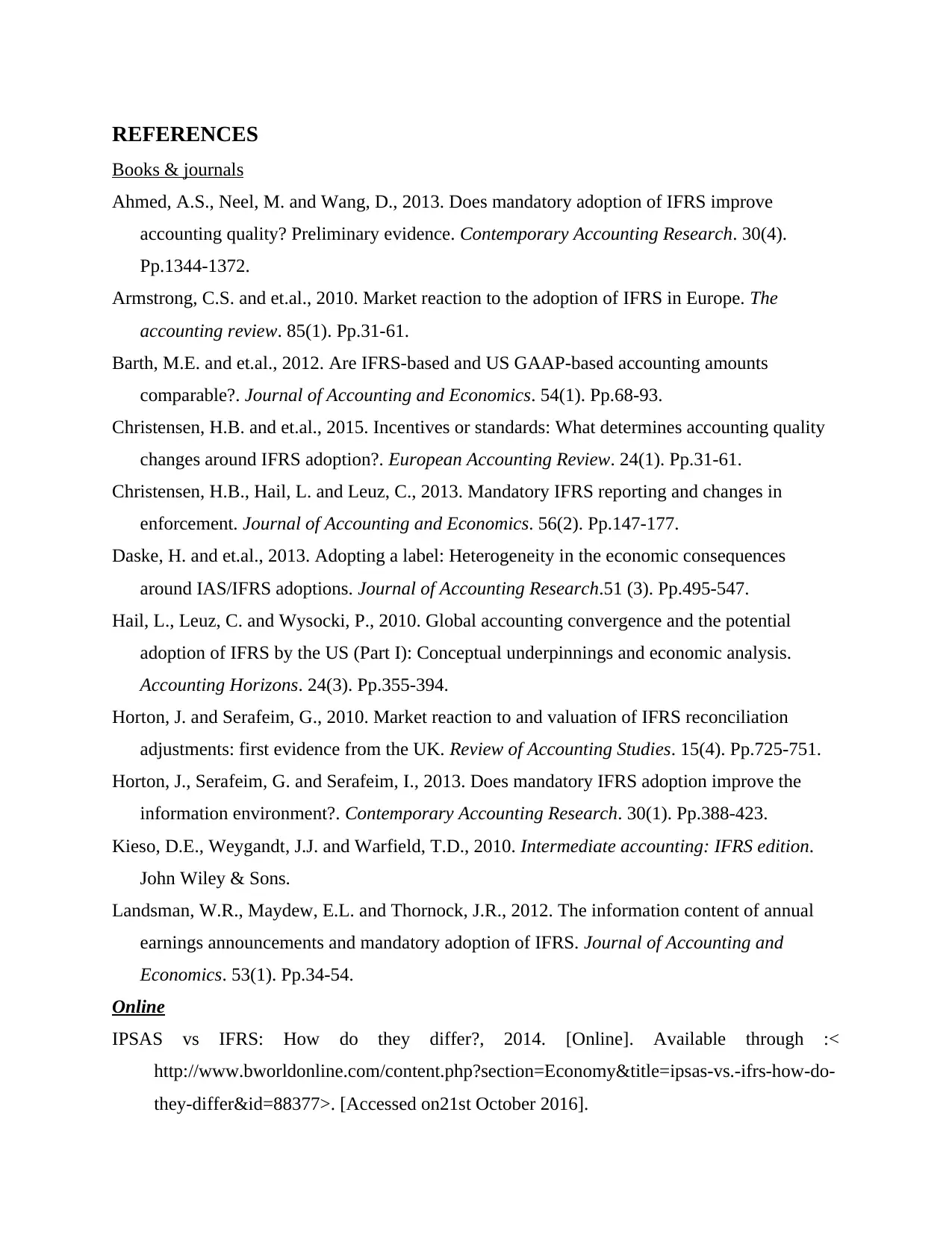
REFERENCES
Books & journals
Ahmed, A.S., Neel, M. and Wang, D., 2013. Does mandatory adoption of IFRS improve
accounting quality? Preliminary evidence. Contemporary Accounting Research. 30(4).
Pp.1344-1372.
Armstrong, C.S. and et.al., 2010. Market reaction to the adoption of IFRS in Europe. The
accounting review. 85(1). Pp.31-61.
Barth, M.E. and et.al., 2012. Are IFRS-based and US GAAP-based accounting amounts
comparable?. Journal of Accounting and Economics. 54(1). Pp.68-93.
Christensen, H.B. and et.al., 2015. Incentives or standards: What determines accounting quality
changes around IFRS adoption?. European Accounting Review. 24(1). Pp.31-61.
Christensen, H.B., Hail, L. and Leuz, C., 2013. Mandatory IFRS reporting and changes in
enforcement. Journal of Accounting and Economics. 56(2). Pp.147-177.
Daske, H. and et.al., 2013. Adopting a label: Heterogeneity in the economic consequences
around IAS/IFRS adoptions. Journal of Accounting Research.51 (3). Pp.495-547.
Hail, L., Leuz, C. and Wysocki, P., 2010. Global accounting convergence and the potential
adoption of IFRS by the US (Part I): Conceptual underpinnings and economic analysis.
Accounting Horizons. 24(3). Pp.355-394.
Horton, J. and Serafeim, G., 2010. Market reaction to and valuation of IFRS reconciliation
adjustments: first evidence from the UK. Review of Accounting Studies. 15(4). Pp.725-751.
Horton, J., Serafeim, G. and Serafeim, I., 2013. Does mandatory IFRS adoption improve the
information environment?. Contemporary Accounting Research. 30(1). Pp.388-423.
Kieso, D.E., Weygandt, J.J. and Warfield, T.D., 2010. Intermediate accounting: IFRS edition.
John Wiley & Sons.
Landsman, W.R., Maydew, E.L. and Thornock, J.R., 2012. The information content of annual
earnings announcements and mandatory adoption of IFRS. Journal of Accounting and
Economics. 53(1). Pp.34-54.
Online
IPSAS vs IFRS: How do they differ?, 2014. [Online]. Available through :<
http://www.bworldonline.com/content.php?section=Economy&title=ipsas-vs.-ifrs-how-do-
they-differ&id=88377>. [Accessed on21st October 2016].
Books & journals
Ahmed, A.S., Neel, M. and Wang, D., 2013. Does mandatory adoption of IFRS improve
accounting quality? Preliminary evidence. Contemporary Accounting Research. 30(4).
Pp.1344-1372.
Armstrong, C.S. and et.al., 2010. Market reaction to the adoption of IFRS in Europe. The
accounting review. 85(1). Pp.31-61.
Barth, M.E. and et.al., 2012. Are IFRS-based and US GAAP-based accounting amounts
comparable?. Journal of Accounting and Economics. 54(1). Pp.68-93.
Christensen, H.B. and et.al., 2015. Incentives or standards: What determines accounting quality
changes around IFRS adoption?. European Accounting Review. 24(1). Pp.31-61.
Christensen, H.B., Hail, L. and Leuz, C., 2013. Mandatory IFRS reporting and changes in
enforcement. Journal of Accounting and Economics. 56(2). Pp.147-177.
Daske, H. and et.al., 2013. Adopting a label: Heterogeneity in the economic consequences
around IAS/IFRS adoptions. Journal of Accounting Research.51 (3). Pp.495-547.
Hail, L., Leuz, C. and Wysocki, P., 2010. Global accounting convergence and the potential
adoption of IFRS by the US (Part I): Conceptual underpinnings and economic analysis.
Accounting Horizons. 24(3). Pp.355-394.
Horton, J. and Serafeim, G., 2010. Market reaction to and valuation of IFRS reconciliation
adjustments: first evidence from the UK. Review of Accounting Studies. 15(4). Pp.725-751.
Horton, J., Serafeim, G. and Serafeim, I., 2013. Does mandatory IFRS adoption improve the
information environment?. Contemporary Accounting Research. 30(1). Pp.388-423.
Kieso, D.E., Weygandt, J.J. and Warfield, T.D., 2010. Intermediate accounting: IFRS edition.
John Wiley & Sons.
Landsman, W.R., Maydew, E.L. and Thornock, J.R., 2012. The information content of annual
earnings announcements and mandatory adoption of IFRS. Journal of Accounting and
Economics. 53(1). Pp.34-54.
Online
IPSAS vs IFRS: How do they differ?, 2014. [Online]. Available through :<
http://www.bworldonline.com/content.php?section=Economy&title=ipsas-vs.-ifrs-how-do-
they-differ&id=88377>. [Accessed on21st October 2016].
1 out of 10
Related Documents
Your All-in-One AI-Powered Toolkit for Academic Success.
+13062052269
info@desklib.com
Available 24*7 on WhatsApp / Email
![[object Object]](/_next/static/media/star-bottom.7253800d.svg)
Unlock your academic potential
Copyright © 2020–2026 A2Z Services. All Rights Reserved. Developed and managed by ZUCOL.





